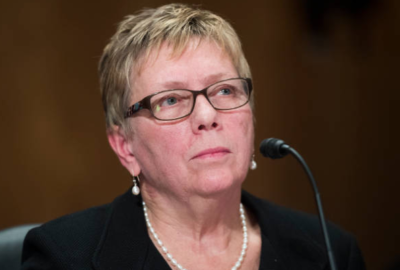

Acknowledging recent decisions may suggest otherwise, the chairman of the Federal Labor Relations Authority said the agency has no "anti-union bias."
The chairman of the Federal Labor Relations Authority on Tuesday attempted to persuade Congress that despite appearances, the agency is not taking an “anti-union” posture in its interactions with other agencies — or its own employees.
The House Oversight and Reform Government Operations Subcommittee questioned FLRA Chairman Colleen Kiko about her decisions to close two of the agency’s regional offices and end formal recognition of the FLRA’s own employee union within the past year.
The FLRA governs labor relations as a quasi-judicial and arbitration body for its customers, which include federal agencies, employees and unions. But Democrats on the subcommittee argue a series of recent management decisions from FLRA leadership show the agency is being kind to some of its customers, but not all.
“If this is an initiation of an anti-union ‘modus operandi,’ then we have a real problem,” Rep. Mark Meadows (R-N.C.), the subcommittee’s ranking member, said at a Tuesday hearing that was billed as an examination of federal labor-management relations. “You even have a problem with me. Is it your sworn testimony today that your motivation was not an anti-union motivation but it was [more about] efficiency in your reorganization plan?”
“I have no anti-union bias in any regard, in any of the decisions that I make in this agency,” Kiko said. “My job here is to interpret the statute, and I will do that as long as I’m sitting here in this agency. This statute says that collective bargaining is in the best interest of the federal government and I believe that. So there is no anti-union bias. Certain decisions suggest that, I understand, but that is not true.”
Kiko defended her plan to reorganize the FLRA, which she said given a dwindling caseload, only made sense to trim agency costs and find more efficient ways to get the work done.
The agency’s annual intake of unfair labor practice charges is down more than 40% since 2001, according to Kiko. In addition, “representation petitions” are down more than 50% since 2000.
FLRA’s strategic plan cited similar statistics as its justification to close two regional offices in Boston and Dallas last year.
“In the face of this data, it was hard to justify maintaining regional offices in seven cities when the FLRA’s work could be carried out just as efficiently in fewer locations,” Kiko told the subcommittee.
Meadows agreed.


Of the 16 employees who worked at those two regional offices, seven moved to other jobs within the FLRA, Kiko said. Nine chose to retire or leave for another government agency. Every employee was offered a position at a remaining FLRA office, she said.
The decision to vacate two regional offices in Boston and Dallas was “about closing buildings, not people,” Kiko said.
Democrats and Republicans also questioned Kiko about FLRA’s 31-point nosedive on the 2018 Best Places to Work in the Federal Government rankings from the Partnership for Public Service.
Kiko said she announced plans to close the Boston and Dallas regional offices near the time that employees took the Federal Employee Viewpoint Survey.
“I am doing everything in my power in my agency to look at those questions, to find out which ones were [challenging, and] to find ways to find out the source of that and to see if we could turn it around,” she said.
Kiko also promised Meadows that she would deliver an action plan to improve FLRA’s employee engagement.
Democrats on the subcommittee spent much of their time focused on Kiko’s decision to end recognition of the FLRA’s own union.
Kiko said she based the decision on her own interpretation of the Federal Service Labor-Management Relations statute, which Congress passed into law back in 1978. The statute allows federal employees at certain agencies to organize, bargain and participate in collective bargaining activities. It also exempts some agencies, including the FLRA, from the statute.
It’s for this reason that Kiko said she decided to stop recognizing the FLRA union.
“The statute was created to have one entity separate from the statute in order to maintain neutrality and manage the disputes between all of the other agencies in the federal government that are covered by the statute,” she said.
Democrats, however, took issue with Kiko’s interpretation.
“Your argument would have some cogency if it were new, if we had just passed this statute and you were the first to have to interpret it,” Rep. Gerry Connolly (D-Va.), the subcommittee’s chairman, said. “But we have precedent here. We have 40 years-plus of precedent that would belay what you just asserted. None of your predecessors, Republican or Democrat, ever interpreted the law the way you have interpreted the law, nor have any of them ever taken the action you took.”
Subcommittee members didn’t, however, spend much time questioning Kiko about recent decisions from the FLRA itself and their impact on employee unions. The Federal Service Impasses Panel, a body of seven presidentially-appointed members who serve as a component to the FLRA, has rewritten large portions of at least two union contracts with the Department of Health and Human Services and the Social Security Administration.
Federal unions and employment attorneys have said agencies feel “emboldened” to take their disputes to the FLRA’s impasses panel, because they believe the panel will ultimately rule in management’s favor. HHS has used the panel’s decision to enforce a series of new bargaining articles, which the National Treasury Employees Union said it hasn’t agreed to.
NTEU and other unions have also argued FLRA’s recent decisions narrow the scope of collective bargaining and make it more difficult to enforce employee rights through the grievance procedure.
“This administration’s policy is that robust labor-management collaboration is wasteful, and the FLRA majority’s decisions cater to that unfortunate and erroneous premise,” NTEU National President Tony Reardon said Tuesday in a statement.
In addition, FLRA hasn’t had a general counsel since the start of the Trump administration, which means the agency can’t issue formal decisions on unfair labor practice charges (ULPs). A backlog of about 200 ULPs awaits a new general counsel, whenever confirmed by the Senate.
President Donald Trump nominated Catherine Bird, a principal deputy assistant secretary for administration at HHS, to the general counsel position.
The backlog isn’t of Kiko’s own making, but it added more fuel to the fire for Democrats.
Kiko clearly tried to ease concerns from subcommittee Democrats. She spoke about her 30-year career as a federal employee and described her own father’s 49-year career as a public servant.
“I mention this history to try to convey to you the respect and pride that I have for the FLRA and the men and women who work there,” Kiko said in her testimony. “Although I am only in my second year of a five-year term, it is my sincere intent to leave the agency in a stronger position than when I arrived.”
Still, subcommittee Democrats offered some harsh feedback.
“The anti-union bias seems to be present, if not extreme,” Connolly said. “The agency she leads has not prosecuted a single violation since 2017, and her mismanagement has demoralized and dismantled the capacity of the principle enforcement agency of federal-service law.”
“I look forward to this hearing as an opportunity to put the administration and the FLRA chairman on notice,” Connolly added.
Copyright © 2025 Federal News Network. All rights reserved. This website is not intended for users located within the European Economic Area.
Nicole Ogrysko is a reporter for Federal News Network focusing on the federal workforce and federal pay and benefits.
Follow @nogryskoWFED
